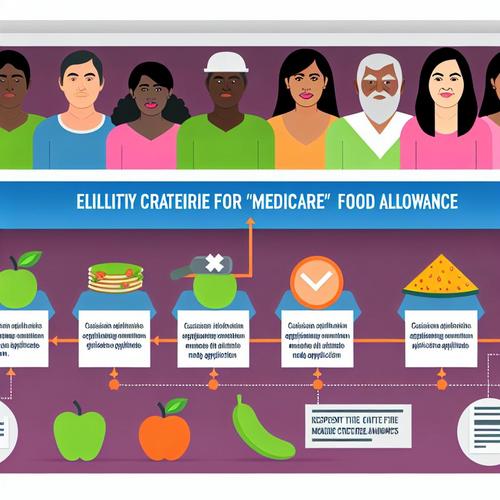Medicare is a valuable program that provides health insurance for individuals aged 65 and older, as well as certain younger people with disabilities. While most people are familiar with the medical coverage that Medicare offers, many may not be aware of the Medicare Food Allowance Program.
Understanding the Medicare Food Allowance Program
The Medicare Food Allowance Program is a supplemental program designed to help eligible participants with the cost of food. This program recognizes that access to nutritious food is essential for overall health and well-being, especially for those who may be facing financial challenges.
Participants in the Medicare Food Allowance Program receive a monthly allowance that can be used to purchase food items. This allowance is a valuable resource that can help individuals stretch their food budget and ensure they have access to the nourishment they need.
It’s important to note that the Medicare Food Allowance Program is separate from the Supplemental Nutrition Assistance Program (SNAP), commonly known as food stamps. While both programs aim to address food insecurity, they have different eligibility requirements and benefits.
For those who qualify, the Medicare Food Allowance Program can be a lifeline that provides much-needed support in meeting basic needs. By understanding the program and its benefits, eligible individuals can take advantage of this valuable resource to improve their overall health and well-being.
As you explore the Medicare Food Allowance Program further, you’ll discover the eligibility requirements, application process, benefits, and resources available to participants. This program is just one of the many ways that Medicare works to support the health and wellness of older adults and individuals with disabilities.
So, you’ve heard about the Medicare Food Allowance Program and you’re wondering if you’re eligible to receive this benefit. Let’s break it down for you!
Eligibility Requirements for the Medicare Food Allowance Program
First and foremost, to be eligible for the Medicare Food Allowance Program, you must be enrolled in Medicare Part B. This is a key requirement, so make sure you have this in place before applying for the program.
Secondly, you must meet certain income and asset limits to qualify for the food allowance. The specific limits can vary depending on where you live, so it’s important to check with your local Medicare office or advisor to determine if you meet the criteria.
Another important factor to consider is your medical condition. In order to be eligible for the food allowance program, you must have a specific medical condition that requires a special diet. This could include conditions such as diabetes, heart disease, or renal disease, just to name a few.
It’s also worth noting that the Medicare Food Allowance Program is not available in all states, so it’s essential to check if this benefit is offered in your area before proceeding with the application process.
Additionally, if you are receiving assistance from other government programs such as Medicaid or Supplemental Security Income (SSI), you may still be eligible for the food allowance program. Be sure to discuss your situation with a Medicare advisor to explore all possible options.
Overall, the eligibility requirements for the Medicare Food Allowance Program are designed to help those who truly need assistance with obtaining nutritious food due to their medical conditions. If you believe you meet the criteria outlined above, it’s definitely worth looking into this program to see if you qualify for this valuable benefit.
Find Medicare Plans in 3 Easy Steps
We can help get up to $0 monthly premium Medicare plans
How to Apply for the Medicare Food Allowance Program
So, you’ve heard about the Medicare Food Allowance Program and you’re interested in applying? Great! Let’s walk through the steps to make the process as smooth as possible for you.
- Check Your Eligibility: Before you start your application, make sure you meet the eligibility requirements for the program. You must be a Medicare recipient, meet certain income guidelines, and have a need for assistance with food expenses. If you’re unsure about your eligibility, don’t hesitate to reach out to a Medicare advisor for guidance.
- Gather Necessary Documents: To complete your application, you’ll need to gather some important documents. These may include proof of income, proof of Medicare enrollment, and any other relevant documentation. Having these ready in advance will help streamline the process.
- Submit Your Application: There are a few different ways you can apply for the Medicare Food Allowance Program. You can apply online through the Medicare website, fill out a paper application and mail it in, or even apply over the phone. Choose the method that works best for you and make sure to provide all the required information accurately.
- Follow Up: Once you’ve submitted your application, it’s important to follow up to ensure it’s being processed. Keep track of any correspondence from the program and respond promptly if they request any additional information or documentation.
- Stay Informed: While you’re waiting to hear back about your application, stay informed about the program and any updates that may impact your eligibility. Medicare advisors can be a valuable resource for staying up to date and understanding your benefits.
Applying for the Medicare Food Allowance Program may seem daunting at first, but with the right information and support, you can navigate the process with confidence. Remember, the goal of the program is to provide assistance to those in need, so don’t hesitate to reach out for help if you have any questions or concerns. Good luck with your application!
Common Mistakes to Avoid When Applying for the Medicare Food Allowance Program
Applying for the Medicare Food Allowance Program can be a great way to ensure that you have access to nutritious meals as you age. However, there are some common mistakes that many people make when applying for this program. By avoiding these pitfalls, you can increase your chances of being approved for the program and receiving the benefits you deserve.
- Not Providing Accurate Information: One of the most common mistakes people make when applying for the Medicare Food Allowance Program is not providing accurate information on their application. It is important to double-check all of the information you provide to ensure that it is correct. Any errors or discrepancies could result in your application being denied.
- Missing Deadlines: Another common mistake is missing deadlines. Make sure to submit your application before the deadline to avoid any delays in processing. Keep track of important dates and set reminders to ensure that you do not miss any deadlines.
- Not Seeking Help When Needed: If you are unsure about any part of the application process, do not hesitate to seek help. There are resources available to assist you in completing your application accurately and on time. Medicare advisors can provide guidance and support to help you navigate the process successfully.
- Ignoring Eligibility Requirements: It is essential to carefully review the eligibility requirements for the Medicare Food Allowance Program before applying. Make sure that you meet all of the criteria and provide any necessary documentation to support your eligibility. Failure to meet the requirements could result in your application being denied.
- Not Keeping Track of Communication: Once you have submitted your application, make sure to keep track of any communication from the program. Check your email and mailbox regularly for updates on the status of your application. Respond promptly to any requests for additional information to avoid delays in processing.
- Assuming Ineligibility: Do not assume that you are not eligible for the Medicare Food Allowance Program without exploring your options. Even if you think you may not qualify, it is worth applying to see if you meet the criteria. You may be surprised to find that you are eligible for benefits that can help improve your quality of life.
Avoiding these common mistakes can help streamline the application process and increase your chances of being approved for the Medicare Food Allowance Program. By providing accurate information, meeting deadlines, seeking help when needed, understanding eligibility requirements, keeping track of communication, and exploring all options, you can navigate the application process successfully and receive the benefits you deserve.
Find Medicare Plans in 3 Easy Steps
We can help get up to $0 monthly premium Medicare plans
Benefits of Working with Medicare Advisors for your Food Allowance Eligibility
When it comes to navigating the ins and outs of the Medicare Food Allowance Program, having the guidance of Medicare advisors can make a world of difference. These professionals are well-versed in the eligibility requirements, application process, and benefits of the program, and can help you maximize your food allowance benefits. Here are some benefits of working with Medicare advisors:
- Expertise: Medicare advisors have a deep understanding of the Medicare Food Allowance Program and can provide you with expert guidance on how to qualify for the program and receive the maximum benefits.
- Personalized Assistance: Medicare advisors will work closely with you to assess your individual situation and tailor their advice to your specific needs, ensuring that you receive the support you need to access food assistance.
- Efficiency: Navigating government programs can be complex and time-consuming. Medicare advisors can streamline the process for you, helping you avoid common pitfalls and ensuring that your application is submitted accurately and on time.
- Advocacy: If you encounter any challenges or issues with your application or benefits, Medicare advisors can advocate on your behalf and help resolve any issues that may arise, ensuring that you receive the support you are entitled to.
- Additional Resources: Medicare advisors can connect you with additional resources and support services that may be available to you, helping you access a comprehensive network of assistance to meet your needs.
Overall, working with Medicare advisors can provide you with the guidance, support, and advocacy you need to navigate the Medicare Food Allowance Program successfully and access the food assistance you are entitled to. If you are considering applying for the program or have questions about your eligibility, reaching out to Medicare advisors can be a valuable resource to help you navigate the process and maximize your benefits.
Tips for Maximizing Your Medicare Food Allowance Benefits
So you’ve been approved for the Medicare Food Allowance Program – congratulations! Now, you might be wondering how you can make the most out of this benefit. Here are some tips to help you maximize your Medicare food allowance benefits:
- Plan Your Meals: Take some time to plan your meals ahead of time. This can help you make the most of your food allowance by ensuring that you purchase only the items you need for your planned meals.
- Shop Smart: Look for sales, discounts, and coupons to stretch your food allowance further. Consider buying generic brands or shopping at discount stores to save money on your groceries.
- Buy in Bulk: Purchasing items in bulk can help you save money in the long run. Consider buying non-perishable items, such as rice, pasta, and canned goods, in larger quantities to make your food allowance go further.
- Meal Prep: Spend some time each week meal prepping. This can help you save time and money by cooking in batches and portioning out your meals for the week ahead.
- Grow Your Own Food: If you have the space and resources, consider growing your own fruits, vegetables, and herbs. Not only can this help you save money, but it can also ensure that you have access to fresh, healthy produce.
- Consider Community Resources: Look into local food banks, community gardens, or meal programs that can help supplement your food allowance. These resources can provide additional support and help you stretch your food budget even further.
- Stay Organized: Keep track of your food allowance spending to ensure that you are staying within your budget. Consider using a budgeting app or spreadsheet to help you track your expenses and make adjustments as needed.
- Ask for Help: If you are struggling to make ends meet or need additional support, don’t hesitate to reach out for help. Your Medicare advisor or local social services agency may be able to connect you with additional resources or assistance programs.
By following these tips and being mindful of your spending, you can make the most out of your Medicare food allowance benefits. Remember, your health and well-being are important, and ensuring that you have access to nutritious food is essential. Take advantage of the resources available to you and don’t be afraid to ask for help when needed. Your health and well-being are worth it!
Find Medicare Plans in 3 Easy Steps
We can help get up to $0 monthly premium Medicare plans
Resources Available for Medicare Food Allowance Program Participants
Once you have successfully enrolled in the Medicare Food Allowance Program, you may be wondering what resources are available to help you make the most of your benefits. Here are some key resources that can assist you in maximizing your food allowance:
1. Nutrition Education Programs
Many Medicare Food Allowance Programs offer nutrition education programs to help participants make healthy food choices and improve their overall well-being. These programs may include cooking classes, workshops, and seminars on topics such as meal planning, portion control, and reading food labels.
2. Grocery Store Discounts
Some Medicare Food Allowance Programs partner with local grocery stores to provide discounts to program participants. These discounts can help you save money on your grocery bill and stretch your food allowance even further. Be sure to ask your program administrator about any available discounts at participating stores.
3. Community Food Pantries
If you find yourself in need of additional assistance beyond your food allowance, community food pantries can be a valuable resource. These organizations provide free or low-cost food to individuals and families in need. Contact your local food pantry to see how they can support you.
4. Online Resources
There are a wealth of online resources available to help you make the most of your food allowance. Websites and apps like MyPlate, ChooseMyPlate, and SuperTracker offer tools and resources for meal planning, healthy recipes, and nutritional information. Take advantage of these resources to help you make informed food choices.
5. Support Groups
Joining a support group for individuals participating in the Medicare Food Allowance Program can provide you with a sense of community and encouragement. These groups can offer emotional support, practical tips, and a place to share experiences with others who are in a similar situation. Check with your program administrator to see if they offer any support group options.
By taking advantage of these resources, you can enhance your experience with the Medicare Food Allowance Program and improve your overall health and well-being. Remember, it’s important to stay informed and engaged in order to make the most of your benefits. If you have any questions or need assistance, don’t hesitate to reach out to your program administrator for guidance.
Assistant has completed the task. Click below to download the HTML file.






